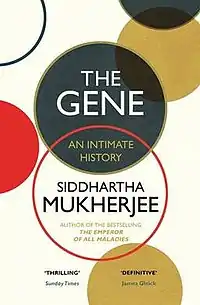The Gene: An Intimate History
The Gene: An Intimate History is a book written by Siddhartha Mukherjee, an Indian-born American physician and oncologist. It was published on 17 May 2016 by Scribner.[1] The book chronicles the history of the gene and genetic research, all the way from Aristotle to Crick, Watson and Franklin and then the 21st century scientists who mapped the human genome. The book discusses the power of genetics in determining people's well-being and traits. It delves into the personal genetic history of Siddhartha Mukherjee's family, including mental illness. However, it is also a cautionary message toward not letting genetic predispositions define a person or their fate, a mentality that the author says led to the rise of eugenics in history.
 Cover of The Gene: An Intimate History | |
| Author | Siddhartha Mukherjee |
|---|---|
| Country | United States |
| Language | English |
| Subject | Genetics |
| Publisher | Scribner |
Publication date | 17 May 2016 |
| Pages | 592 |
| ISBN | 978-1-4767-3350-0 (Hardcover) |
Awards and honours
- 2016: Royal Society Prizes for Science Books shortlist[2]
- 2016: Baillie Gifford Prize for Non-Fiction longlist[3]
- 2016: Washington Post's "10 Best Books of 2016", The Gene.[4]
- 2016: Goodreads Choice Award Nominee for Science & Technology[5]
- 2017: Wellcome Book Prize shortlist[6]
- 2017: PEN/E.O. Wilson Prize for Literary Science Writing Nominee for Longlist[7]
- 2017: Phi Beta Kappa Society Book Award in Science[8]
Reviews
Bryan Appleyard of The Sunday Times called it "Dramatic and precise... thrilling and comprehensive account of what seems certain to be the most radical, controversial and, to borrow from the subtitle, intimate science of our time. He is a natural storyteller... A page-turner... Read this book and steel yourself for what comes next."[9]
Andrew Solomon wrote in the Washington Post: "With a marriage of architectural precision and luscious narrative, an eye for both the paradoxical detail and the unsettling irony, and a genius for locating the emotional truths buried in chemical abstractions, Mukherjee leaves you feeling as though you’ve just aced a college course for which you’d been afraid to register – and enjoyed every minute of it."[10]
Criticism and response
In his 2016 article 'Same but different', an excerpt from the chapter "The First Derivative of Identity" of this book, in The New Yorker, he attributed the most important genetic functions to epigenetic factors (such as histone modification and DNA methylation).
"Chance events—injuries, infections, infatuations; the haunting trill of that particular nocturne—impinge on one twin and not on the other. Genes are turned on and off in response to these events, as epigenetic marks are gradually layered above genes, etching the genome with its own scars, calluses, and freckles."[11]
This analogy based on his mother and her twin sister, who have distinct personalities, was critiqued by geneticists such as Mark Ptashne, at the Memorial Sloan Kettering Cancer Center, and John Greally, at the Albert Einstein College of Medicine, because of over emphasis on histone modification and DNA methylation, when they really are only minor contributors. Steven Henikoff, at the Fred Hutchinson Cancer Research Center, opined that, "Mukherjee seemed not to realize that transcription factors occupy the top of the hierarchy of epigenetic information... histone modifications at most act as cogs in the machinery."[12] In response, Mukherjee did admit "he now realizes that he erred by omitting key areas of the science, but that he didn’t mean to mislead. 'I sincerely thought that I had done it justice.' "[12]
References
- The Gene. "The Gene: An Intimate History". Retrieved 17 May 2016.
- "Shortlist for The Royal Society Insight Investment Science Book Prize 2016 unveiled". The Royal Society. 6 August 2016.
- "Nobel laureate Svetlana Alexievich heads longlist for UK's top nonfiction award". 20 September 2016.
- "10 Best Books of 2016". The Washington Post. 17 November 2016.
- "Goodreads Choice Award". Goodreads. Retrieved 26 April 2018.
- Danuta Kean (14 March 2017). "Wellcome prize shortlist announced: books that 'will change lives'". The Guardian. Retrieved 24 April 2017.
- "PEN/E.O. Wilson Prize for Literary Science Writing". Goodreads. Retrieved 26 April 2018.
- DeSimone, Bailey (1 December 2017). "The Key Reporter - Siddhartha Mukherjee". keyreporter.org. The Phi Beta Kappa Society. The Key Reporter.
- Appleyard, Bryan (22 May 2016). "Books: The Gene: An Intimate History by Siddhartha Mukherjee". The Times. The Times & The Sunday Times. Retrieved 30 September 2016.
- Solomon, Andrew. "When we unlock the secrets of our genes, what do we do with that knowledge?". 12 May 2016. Retrieved 30 September 2016.
- Mukherjee, S. The Gene: An Intimate History. US: Scribner. ISBN 978-1-4767-3350-0.
- Woolston, Chris (2016). "Researcher under fire for New Yorker epigenetics article". Nature. 533(7603): 295–295. doi:10.1038/533295f.